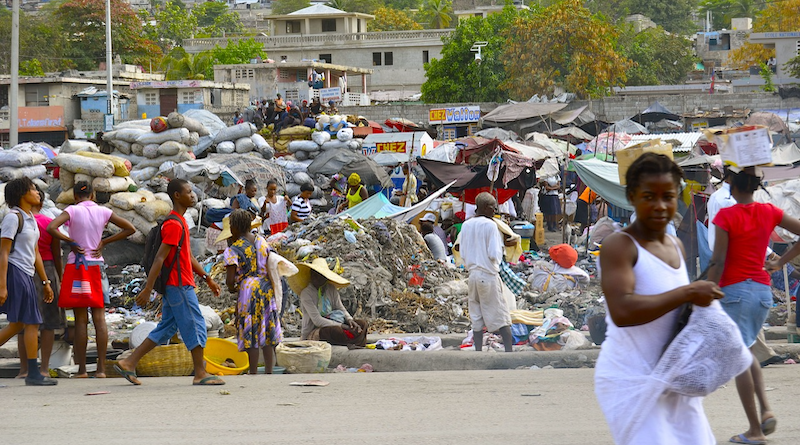Assistance For Haiti: Canada Needs To Engage – OpEd
By Bruce Mabley
Haiti is again in serious domestic trouble. The American President will visit briefly Canada this week and ask for our help in Haiti. We should give it gladly since it can only make the situation better. Biden is handing us a place in the sun in our shared sphere of influence in the Caribbean. In a geo-political sense, Haiti may be the key to forestalling the inexorable threat from Beijing in the Caribbean basin and wean Cuba off Russia.
The key is to use competent and influential allies on the ground in Haiti and regional allies. If America insists on our help in Haiti, we should give it even if the first wave of assistance must be in the form of a well-planned military action against the ravages of criminal gangs. We should not ‘assist’ by taking the government’s point of view. The policy should be a transparent bottom-up approach like Hezbollah. We do not want to be identified by the Haitian people as just another corrupt police force. We are not the United Nations.
To ensure this bottom-up approach, Canadian political and military personnel need to be trained to work in developing communities taking their side against the criminal gangs and, if necessary, against the government. Past interventions failed having been correctly perceived by Haitians as pro-authoritarian law and order at any cost. It is time for the Haitian people to insist on a grass roots approach designed to win over the hearts and minds of the population. Another pro-authority at all costs philosophy will fail again. Canada needs to think and act more coherently and recognize that Haiti is one of the keys to our regional role.
Canada must find a new assistance formula that uses bottom-up instead of top-down political authority. Without this new innovative assistance philosophy, we will be put in the same boat with the bureaucracy-bloated United Nations. Haiti has already tried many different formulae. None have worked.
Yet, the Canadian government hesitates. When the Haitians come across the US Canada border at Chemin Roxham in Québec, suddenly the Canadian authorities become more lenient. ‘As long as they stay in Haiti’ is the not so colourful refrain, one the government embraces secretly while passing off its inaction in name of ‘black lives matter’. Re-election in the midst of potentially dead black Haitians is not the message needed by the federal Liberals. They believe in ‘black lives matter’. So, do I. Do all Black lives matter? Do all white lives matter? This is the key question that Haiti that poses today. Apathy and indifference appear to be the policy, especially when the government is intent on covering up on its lack of an international and regional vision. The present Liberal government itself is a minority one, riddled with scandals and falling in the polls.
Yet, opportunity knocks. If ‘black lives do matter’ is taken in a universal sense, in Haiti, then the criminals and their gangs find a theoretical haven. The truth is that like white lives, all black lives matter until they take the lives of the innocent for personal gain or profit. They then invalidate the universal message that ‘Black lives matter’. All lives matter but those who prove by their actions that they do not wish to flourish in a law and order democratic society must be expelled from the social contract. The social contract is also a political bond. It is not the State of nature as Hobbes described it and must not be left to whither on a branch.
If America, and the Biden administration, desire our help we should give it after negotiation. Offsets may be required in order to secure regional buy-in for Haiti. It is an ideal opportunity to a) wean Cuba off Russia and China, b) improve the collective lot of the Cuban people by removing some US sanctions, c) pave the way for a new Canadian foreign policy in the Caribbean, a region where Canada will come to be seen as a problem-solver rather than an indifferent white country, apathetic and crippled by domestic polarization. By a lack of foreign policy vision and innovation, the Syrian fiasco comes to mind.
From a geo-political standpoint, Canada must begin to pull its regional weight. Our role in the Arctic is a prime example of Canadian dilly dallying and procrastination. The Haitian regional challenge could be a positive development. Everyone knows Haiti is a tough nut to crack. The former UN Chief David Wimhurst (formerly with the Montreal Gazette) can testify to that and he would be one of our regional contacts to liaise with. At present, Haiti stands as a bad example in a sphere of American and Canadian influence. If a bottom-up and regional solution can be found using Mexico, Jamaica and Cuba, the pre-conditions for a Canadian-led intervention on the ground are present.
There will be deaths, both civilian and military, black and white. The logic of a such an invention is written on the faces of frightened and desperate Haitians of goodwill. Canada, in order to maintain its belief in ‘Black lives matter’ and reignite our membership in the Organization of. American States (OAS), should intervene in an efficient and rapid manner. It is in Canada’s strategic interest to do so. It is in the interests of humanity and saving Haitian lives of the innocent that such action is required in collaboration with our regional partners and neighbours. To do nothing and stand by is to have Haitian blood on your hands.
Canada must do better.

